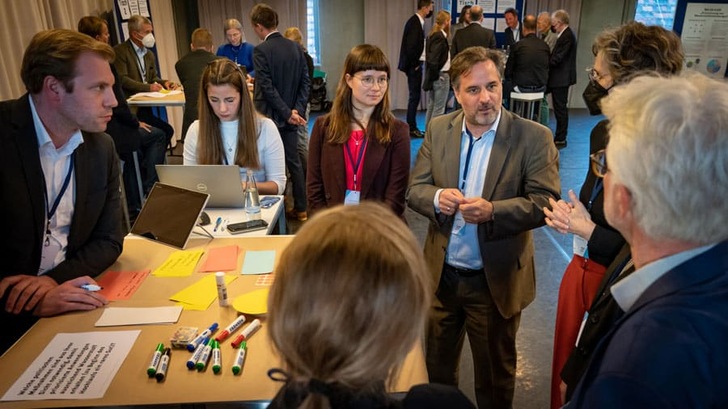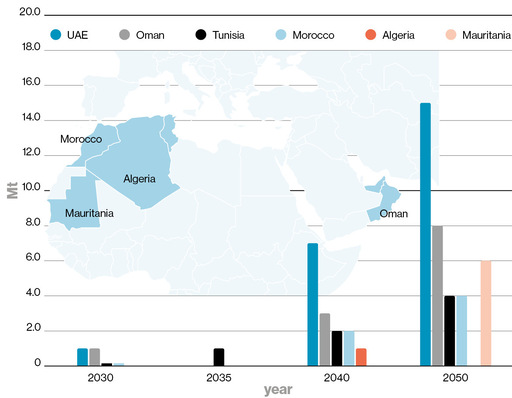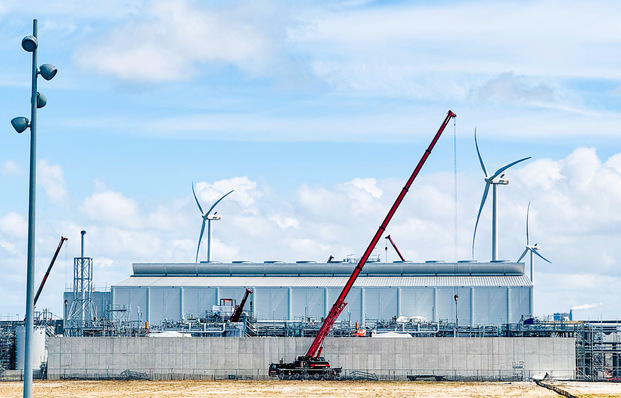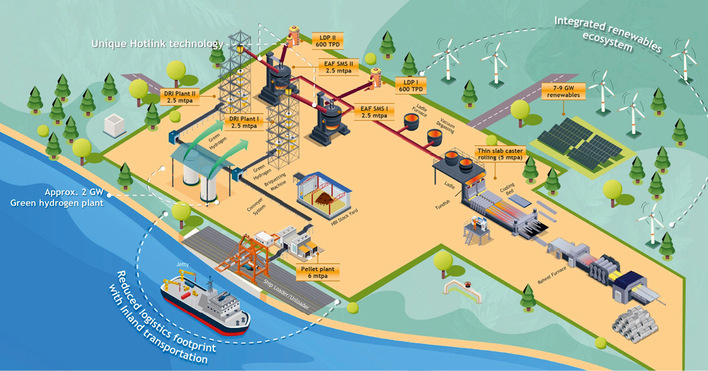The looming climate crisis and the inadequate diversification regarding energy source countries made visible by the Russian aggression in Ukraine is evidence that more speed is needed in the energy transition. Hydrogen will play an important role in the energy systems of the future. Due to this time pressure, the German government has taken on the responsibility of making the ramp-up of the hydrogen economy more efficient. But how exactly is this to be achieved? What options are available for carrying out this task, and what advantages and disadvantages are associated with them? Which actions need to be taken, and when, to enable the ramp-up, while avoiding unwanted path dependencies?
These are the questions that Acatech (Deutsche Akademie der Technikwissenschaften eV) and DECHEMA (Gesellschaft für Chemische Technik und Biotechnologie eV) have been investigating as part of the two-year project H2-Kompass (Wasserstoff-Kompass) since June 2021. The central product of this project will be an orientation tool of the same name, available starting from the second quarter of 2023. This market-oriented, data- and fact-based tool can be used by policymakers to further develop a national hydrogen roadmap. This is what the German national hydrogen strategy of 2020 envisages. The project is being funded by the German ministry for education and research (Bundesministerium für Bildung und Forschung, BMBF) as well as the ministry for economy and climate protection (Bundesministerium für Wirtschaft und Klimaschutz, BMWK).
The basis of Kompass is, on the one hand, a meta-analysis. It evaluates relevant studies and strategy papers for Germany, the EU and other important countries around the world, and provides an overview of the current and future hydrogen quantities and requirements. This quantity structure and related technological issues are being verified and debated in a multitude of expert discussions.
Secondly, Kompass incorporates the results of a broad-based stakeholder dialogue that lasted around twelve months. This was conducted with people from academia, commerce, public service and community development to obtain their views and to work towards a common vision of a German hydrogen economy. This comprehensive stakeholder dialogue makes H2-Kompass a unique feature in the H2 project landscape.
Bearings for policymakers
A look into the year 2045: A bus is on a newly paved road taking passengers to the next city in the district. But what is the road surface made of? When an asphalt road is built or repaved today, bitumen is used as a binder. This dark, sticky hydrocarbon mixture is produced in today’s refineries as a byproduct during the processing of crude oil. When refineries no longer process fossil resources in the future, this byproduct will in all likelihood no longer be produced. Also other classic byproducts, such as sulfur or lubricating oils, refined to their corresponding qualities, are missing in a refinery converted to instead process hydrogen derivatives, and would have to be obtained in future via other process routes or from other sources.
This example shows that the potential use of hydrogen is associated with many overarching consequences along the entire value chain, which include, among other things, a need for policy changes regarding industry and labor markets as well as for security of supply and social acceptance. At the beginning of the market ramp-up will be many possibilities and challenges. Here, H2-Kompass is to provide orientation, specifically through simultaneous consideration of multiple fields of action: production and import, infrastructure, steel industry, chemical industry, refineries, other industries, transport, power generation, and building and process heat.
Wasserstoff-Dialog conference in autumn 2022
The conference Wasserstoff-Dialog from October 10th to 12th, 2022 brought 370 stakeholders from the hydrogen community together in Berlin. Co-organizer of the conference was the research alliance Forschungsnetzwerk Wasserstoff, which held a meeting during the first part of the conference. The joint part midway through the conference culminated in a top-class panel on the topic “Deutschlands Wasserstoffwirtschaft – Einblicke in politische und industrielle Herausforderungen” (Germany’s hydrogen economy – insights into political and industrial challenges). Among others were BMWK parliamentary secretary Stefan Wenzel and BMBF innovation officer for green hydrogen Till Mansmann. Subsequently, the H2-Kompass used formats such as a poster exhibition und world cafés to obtain feedback from the participants on the results produced so far.
Defining targets for the hydrogen ramp-up
The stakeholder dialog component of the project started in autumn 2021 with the survey “Ziele und Wege zur Wasserstoffwirtschaft 2030/2050” (goals and paths to a hydrogen economy by year 2030/2050). Participating were around 600 people from academia, commerce, community development and public service. From April to September 2022, H2-Kompass organized four workshops with the topics 1) import criteria, 2) policies to enable success of business models reliant on domestic hydrogen production, 3) prioritizing the uses of hydrogen and 4) perception and expectation management. The propositions produced in the workshops were discussed by a wider stakeholder circle during the three-day Wasserstoff-Dialog conference in October 2022 in Berlin. The results from the stakeholder dialog were worked into the end product, that is, the H2-Kompass. A synthesis paper in the first quarter of 2023 will summarize the key discussion points.
Meta-analysis compiles time-dependent quantity structure
H2-Kompass continuously collects strategy papers, and studies and analyzes them, and evaluates and verifies them through discussions with experts. Based on this, a time-dependent quantity structure is being creating from hydrogen supply and demand in the individual sectors, taking into account the necessary infrastructures for transport, storage and distribution. Furthermore, H2-Kompass maintains a project database to keep track of the generation capacities in Germany.
Publications based on the meta-analysis conducted by H2-Kompass
In the course of the project, H2-Kompass has so far published analyses on the following topics:
- Comparison of the hydrogen ramp-up strategies of the different German states
- · Fact Sheet Wasserstoff im Wärmesektor (hydrogen in the heating sector)
- International ship transport: climate-neutral drive systems and fuels
- Climate neutrality in air transport
- Hydrogen in the transportation sector
- Fact Sheet Wasserstoff in der Stahlindustrie (hydrogen in the steel industry)
- Raw materials for the production of electrolyzers
- Electrolyzer capacities
Until the end of the project, analyses will follow on hydrogen in the electricity sector, hydrogen in other industrial sectors – such as cement, lime, glass and paper, – hydrogen use in refineries and the chemical industry, and on the infrastructure requirements of hydrogen ramp-up.
References:
BMWi: Die Nationale Wasserstoffstrategie. 2020.
acatech, DECHEMA: Auf dem Weg in die deutsche Wasserstoffwirtschaft: Resultate der Stakeholder*innen-Befragung. 2021. https://www.wasserstoff-kompass.de/fileadmin/user_upload/img/news-und-media/dokumente/wasserstoffwirtschaft-2030-2050/Umfragebericht_Langversion.pdf
acatech, DECHEMA: Kapazitäten der Elektrolyse. 2022. https://www.wasserstoff-kompass.de/news-media/dokumente/erzeugungskapazitaeten
Author:
Alena Müller, Stakeholder-Referentin im Wasserstoff-Kompass, acatech
mueller@acatech.de
Image: World café “Priorisierung von Wasserstoff-Anwendungen” (prioritizing the uses of hydrogen) during the conference Wasserstoff-Dialog
Source: Svea Pietschmann, acatech






